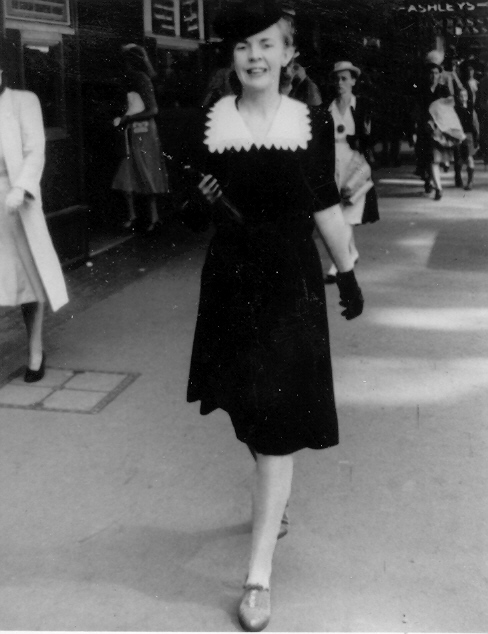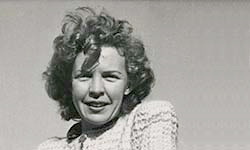Rosina Ruth Park (1917 - 2010)
This site has been created to celebrate the life and works of author Ruth Park.
Born in New Zealand in 1917, Ruth Park spent most of her adult life in Australia. She was widely read and well-loved for her books which were as equally successful for adults as for children.
Park was catapulted into fame when she won the inaugural Sydney Morning Herald Literary Competition in 1946, with her novel The Harp in the South. This book has never been out of print. Her literary reputation grew as she honed her craft, writing fiction and non-fiction, winning a variety of awards and much acclaim. Her output of work spanned nearly seven decades.
Ruth Park died in December 2010.
The piece below was written in 1988. Ruth Park tells her young readers about her life and the reason she became a writer.
BECOMING A WRITER
by Ruth Park
Many years ago I was born in that green, snowcapped archipelago called New Zealand, and I'm very glad I was. Probably I am a writer because I had a singular childhood. My first seven years I spent all alone in the forest, like a possum or a bear cub. It was rainforest, pathless, dense; its light was a dim green twilight. How did I get there?
My father was a bridge builder and road maker; he drove some of the first roads through the forested Crown lands of northern New Zealand. My mother and I travelled with him, living in tents beside mountain streams lively with trout and eels. My father's head was crammed with the savage hero tales of his ancestral land, Scotland. How lucky I was that he had the gift of storytelling! You must imagine lamplight, owls hoo-hooing, the tent fly cracking with frost, and myself, this bear cub child, listening to the stories I would play out by myself in the bush, next day. I developed an imagination both rich and rowdy. But there was one thing I had not imagined. When I went to school at last, I was totally astounded, almost frightened, to see children playing together. I hadn't known they did that!
Although I loved school, I wasn't at all interested in children's games. However, I learned how. to pretend, and became on the surface just another kid, though inside I knew I wasn't. This didn't make me happy. I really believed I was a changeling. (We didn't know the word 'alien' then, otherwise I would have thought I had been dropped by a Rigelian spaceship.) I longed to be like everyone else, but my solitary early life had made me different somehow. My friends were almost all Maori children, little forest creatures like myself.

Ruth Park in Sydney, 1940s
By the time I was eight I was writing. I entered all kinds of verse and story competitions, and when I was eleven I won one of these. My story was published. This went straight to my head. I saw my life's work laid out before me, and have never stopped writing since. I think, even at the age of eleven, I felt comfortable writing, more the real person I knew I was.
I was educated mainly in Auckland. I did an external University degree while I worked as a journalist, on the Auckland Star. At this time I also did a great deal of freelance writing - mostly unsuccessful, I fear. There were few markets in New Zealand for a freelance, so I submitted work to journals all over the world. Nobody had a larger mail of returned typescripts than I did! When I was nineteen, I became editor of a very large children's section on my newspaper. It was really like a small newspaper in itself. Here I learned a great deal about what children like to read, as opposed to what they're told they ought to like. I made a vow then that I would always be true to child readers. I'd never write for publishers, or editors or critics, or to win prizes. I would just write as best I could for children.
The time came when I knew I had to leave my green islands and find a wider world, so I went to Australia and married D'Arcy Niland, a young short story writer. For a while we led a wandering life. I saw a little of this vast, magnificent land, and was captured for ever by its noble indifference to humankind. I felt that one day this continent would give a shrug and shake all the humans off into the sea. But it would,still be its own self. That's what I call identity.
D'Arcy and I wrote everything that came to hand - stories, films, radio plays and television plays, and then adult novels. Literary work was not well-paid; we had to work very hard, and we were often very poor. But we had five good children, and a happy life.
D'Arcy died suddenly when he was 49 but he had already achieved a great deal. Our children grew up - two quite famous book illustrators, a librarian, a physicist, and a musician. I found work that took me to many countries, Norway, Japan, Egypt, and Britain. This work was mostly television, film, and sometimes special assignments in journalism, but gradually I was able to concentrate more and more on writing for children. I don't find the latter easy at all.
Most adult writing is designed to expand the reader's inner world, but children's writing is largely the reverse. For the child the doors of imaginative vision open outwards; the content of the story is the marvellous world beyond these doors, and one's technique and style are what opens them. My ambition is to open the magic casements for kids, to help them grow, to feel strong, just a little.
Now I'm quite an old woman, I find I haven't changed much. I spend part of the time living amongst giant trees, on a little island green as mint and about as big as a handkerchief - Norfolk Island, which is a thousand kilometres off the coast of Australia. I still tell myself and other people stories. I still think the earth is a marvellous home for me and everyone else. I hope you do too.
Text Copyright © 1988 Ruth Park, Photos © Niland Collection.
